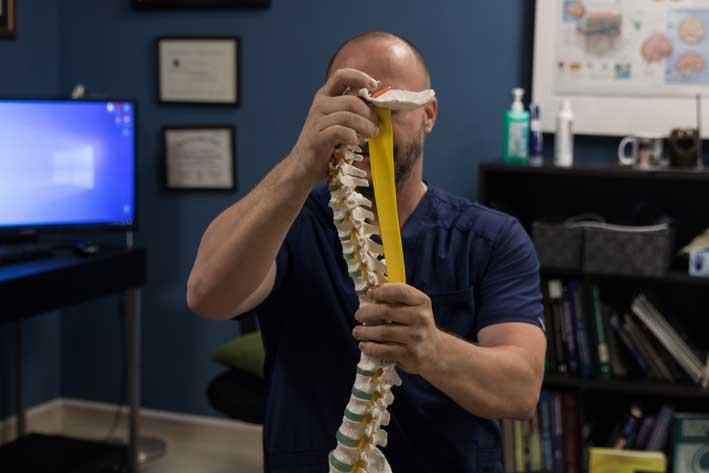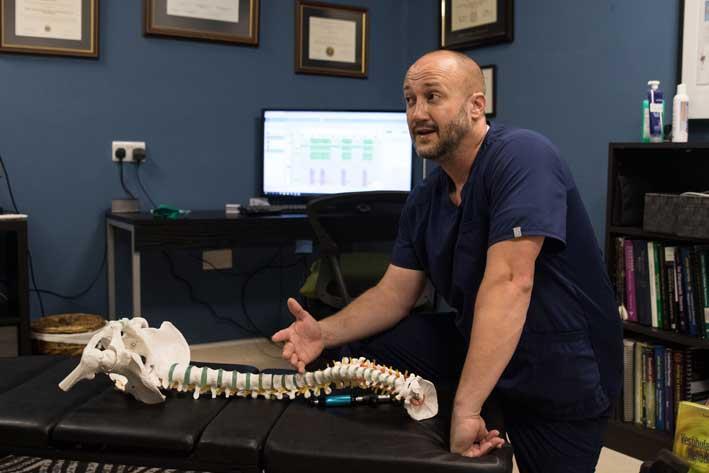Sitting for long hours, and bad posture, have the same negative impact on our back that sugar has on our teeth, said Dr Matthew Stevens, talking to The Malta Independent on Sunday. “The only issue is that we do not think about looking after our spine to the same extent as we think about looking after our teeth and face and yet, at the end of the day, it is back and spine pain which sends us to the doctor.”
Together with Dr Cristin Fitzpatrick, Dr Stevens treats patients at the Mediterranean Brain & Spine Centre at Hilltop Gardens – St Anthony’s Clinic – in Naxxar, which has just celebrated its second anniversary.
Both Dr Stevens and Dr Fitzpatrick are certified as Doctors of Chiropractic in the USA, where they underwent their training, as well as being licensed in Malta. Dr Stevens is also certified in Chiropractic Neurology and a Fellow of the American Board of Brain Injury and Rehabilitation. They both wish to share their knowledge and bring more awareness to people of the importance of taking care of your spine; especially from a young age. “Awareness is the key to a healthy spine and life. We want our children to be in control of their posture, and to understand that the spine is a vital part of our body and that, if is blocked, we cannot function properly.”

Look up! Awareness of spine
“We see children of all ages, including babies, in our clinic: some for a simple check-up and others with specific concerns,” said Dr Stevens. “They go into the waiting room and sit down, titling their head to look at their mobile phone screen, and we always point this out to them.” He talked about the campaigns across America to encourage children to take posture breaks and to hold up their phone instead of constantly being hunched over it. “Technology is not going anywhere, so we’re promoting awareness in Malta which focuses on how we can balance technology in our daily lives while also taking care of our health.
“In addition,” said Dr Stevens, “schools have consulted our GPs and we have spoken to parents, children and teachers regarding the importance of their spine and explaining the benefits of ‘posture breaks’. An hour of exercise does not reverse the damage that sitting on a chair for three hours does to you. It’s about frequency, not intensity. We want students to stand up, stretch, do jumping jacks and arm circles and get them into the habit of doing these exercises.”
He added that these ‘posture breaks’ not only act as a physical break but also as a mental break for children that will help them focus more on their work. He said that explains to the children and staff how certain movements and exercises have an impact on – and benefit – the brain.

‘Tech-Neck’ and bad posture on the increase in children
People who spend their days leaning downwards over a laptop or phone are suffering from aches and pains, better known as ‘tech-neck pain’. Tech-neck is when the neck muscles are strained due to the head-forward posture for long periods of time and the neck muscles are strained by the distortion of weight. When asked if he has seen such symptoms of tech-neck, Dr Stevens confirmed that he has seen numerous patients with it, of all ages, but recently it seems that his patients are suffering at younger ages than they were 10 years ago. “It is important that children are aware of their posture, as their lifestyle choices ultimately affect how they will age and if not taken care of, their health will deteriorate.”

Healthy spine, healthy mind
Nobel Prize recipient Dr Roger Sperry once said that “90 per cent of the stimulation in nutrition to the brain is generated by the movement of the spine” and Dr Stevens explained this fact in greater detail. “The brain uses the spine as a window on the outside world, and yet we always forget what an important tool our spine is.” He explained that, when the spine is misaligned or ‘blocked’, or when there is a subluxation – an incomplete or partial dislocation of a joint that affects the mobility of a person, they lose particular impulses to the brain. It is these impulses and constant movement of the spine that help the brain develop and remain healthy.
“We are made to move around, and if you don’t stimulate the spine and move, those impulses begin to fade, which has an impact the-long term development.” He explained that patients come in for help in resolving their back pain, but ultimately it is not just pain in their back, but the affect on their entire body, even mentally. “Even new-borns can experience misalignments in the spine leading to irritability, difficulty sleeping and even trouble relaxing to pass a bowel movement: these are common things we see every day.”

There is no magic to chiropractic – just awareness
Dr Stevens concluded by pointing out that while some people are critical about Chiropractic, it is a case of basic awareness. “Are we conscious of how our lifestyle choices are affecting our body? It is all linked: our diet, our posture and our movement.” He said he wished that, in the same way that people visit dentists to take care of their teeth, more should take care of their spine, especially when the spine is protecting and supporting the super highways of information between the brain and the body. “We don’t want just a pain clinic, we want a wellness clinic.”
He highlighted the fact that if we are more aware of our lifestyle, health choices and posture, our healthcare system would also greatly benefit. “Back and neck pain, and chronic pain, put a strain on the healthcare system, so if we take care of ourselves, our own national healthcare will also benefit.”
“If we sit for long hours in front of our computers and phones, scrolling endlessly, this will lead to a digital dementia. We need to keep ourselves healthy and moving; if you have a beautiful car just sitting in the garage, it’s only going to deteriorate, and the same applies to our bodies.”